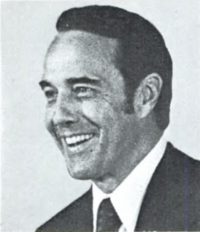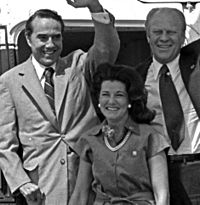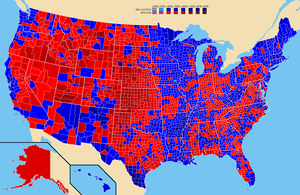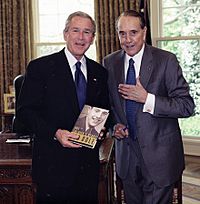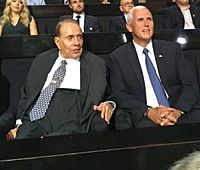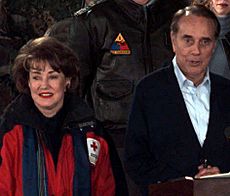Bob Dole facts for kids
Quick facts for kids
Bob Dole
|
|
|---|---|
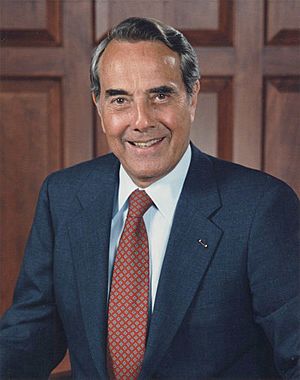
Official portrait, 1980s
|
|
| Senate Majority Leader | |
| In office January 3, 1995 – June 11, 1996 |
|
| President | Bill Clinton |
| Deputy | Trent Lott |
| Preceded by | George Mitchell |
| Succeeded by | Trent Lott |
| In office January 3, 1985 – January 3, 1987 |
|
| President | Ronald Reagan |
| Deputy | Alan Simpson |
| Preceded by | Howard Baker |
| Succeeded by | Robert Byrd |
| Senate Minority Leader | |
| In office January 3, 1987 – January 3, 1995 |
|
| Deputy | Alan Simpson |
| Preceded by | Robert Byrd |
| Succeeded by | Tom Daschle |
| Chair of the Republican National Committee | |
| In office January 15, 1971 – January 19, 1973 |
|
| Preceded by | Rogers Morton |
| Succeeded by | George H. W. Bush |
| United States Senator from Kansas |
|
| In office January 3, 1969 – June 11, 1996 |
|
| Preceded by | Frank Carlson |
| Succeeded by | Sheila Frahm |
| Member of the U.S. House of Representatives from Kansas |
|
| In office January 3, 1961 – January 3, 1969 |
|
| Preceded by | Wint Smith |
| Succeeded by | Keith Sebelius |
| Constituency | 6th district (1961–1963) 1st district (1963–1969) |
| Member of the Kansas House of Representatives from the 81st district |
|
| In office January 9, 1951 – January 13, 1953 |
|
| Preceded by | Elmo J. Mahoney |
| Succeeded by | R. C. Williams |
| Personal details | |
| Born |
Robert Joseph Dole
July 22, 1923 Russell, Kansas, U.S. |
| Died | December 5, 2021 (aged 98) Washington, D.C., U.S. |
| Cause of death | Lung cancer |
| Resting place | Arlington National Cemetery |
| Political party | Republican |
| Spouses |
Phyllis Holden
(m. 1948; div. 1972) |
| Children | 1 |
| Education | Washburn University (BA, LLB) |
| Signature | |
| Military service | |
| Allegiance | |
| Branch/service | |
| Years of service | 1942–1948 |
| Rank | |
| Unit | 10th Mountain Division |
| Battles/wars | World War II (WIA) |
| Awards | Bronze Star Purple Heart |
|
Other offices
1981–1985: Chair of the Senate Finance Committee
1985–1996: Leader of the Senate Republican Conference 1987–1995: Ranking Member of the Senate Agriculture Committee 1953–1961: County Attorney of Russell County, Kansas |
|
Robert Joseph Dole (July 22, 1923 – December 5, 2021) was an American politician and lawyer. He was the United States Senator from Kansas between 1969 to 1996 as a member of the Republican Party. He was the Republican Leader of the United States Senate during the final eleven years of his Senate career from 1985 until 1996. Before his senate career, he was a member of the United States House of Representatives from 1961 to 1969. Dole was the Republican nominee for Vice President in the 1976 election and for President in the 1996 election.
Dole was born and raised in Russell, Kansas, where he began with a legal career after serving in the United States Army during World War II. He was the Russell County Attorney for a short time until he won election to the House of Representatives in 1960. In 1968, Dole was elected to the Senate, where he was chairman of the Republican National Committee from 1971 to 1973 and chairman of the Senate Finance Committee from 1981 to 1985. He was the Senate Majority Leader from 1985 to 1987 and from 1995 to 1996.
President Gerald Ford chose Dole as his running mate in the 1976 election after Vice President Nelson Rockefeller did not want to continue being Ford's vice president. Ford lost the election to Democrat Jimmy Carter in the general election. Dole ran for the Republican presidential nomination in 1980 but quickly dropped out of the race. He ran again for the nomination in the 1988 Republican primaries but lost to Vice President George H. W. Bush. Dole won the Republican nomination in 1996, however lost in the general election to President Bill Clinton. He resigned from the Senate during the 1996 campaign and did not run for public office again after the election.
After retiring from the Senate, Dole appeared in commercials and television programs. In 2012, Dole unsuccessfully supporting Senate passing the Convention on the Rights of Persons with Disabilities. Dole is currently a member of the advisory council of the Victims of Communism Memorial Foundation and special counsel at the Washington, D.C., office of law firm Alston & Bird. On January 17, 2018, Dole was awarded the Congressional Gold Medal. He was married to former U.S. Senator Elizabeth Dole of North Carolina.
Contents
Early life
Dole was born on July 22, 1923, in Russell, Kansas, the son of Bina M. (née Talbott; 1904–1983) and Doran Ray Dole (1901–1975). The Doles lived in a house at 1035 North Maple in Russell and it remained his official residence during his political career.
Dole graduated from Russell High School in the spring of 1941 and went to the University of Kansas. While at the University of Kansas, Dole played for the basketball team, the track team, and the football team. In 1942 he was a teammate of former Tennessee Titans owner Bud Adams, Adams's only season playing football at Kansas. While in college, Dole joined the Kappa Sigma fraternity.
During his college years, Dole enlisted in the United States Army during World War II in 1942. In April 1945, while in combat near Castel d'Aiano southwest of Bologna, Italy, Dole was seriously wounded by German machine gun fire, being struck in his upper back and right arm. His recovery was slow as he had many health problems caused by his injured. Dole recovered from his wounds and was honored three times, receiving two Purple Hearts for his injuries, and the Bronze Star with valor for his attempt to help a radioman. The injuries left him with limited mobility in his right arm and numbness in his left arm.
Dole later went to the University of Arizona from 1948 to 1949, before transferring to Washburn University and graduating with both undergraduate and law degrees in 1952.
Early political career
Dole ran for office for the first time in 1950 and was elected to the Kansas House of Representatives, being a member for a two-year term. In 1952, he became the County Attorney of Russell County. In 1960, Dole was elected to the United States House of Representatives from Kansas' 6th congressional district. After his first term, Kansas lost a congressional district, and most of Dole's district was merged with the 2nd district to form a new 1st district. Dole was elected from this district in 1962 and was reelected two more times.
During his time as a U.S. Representative, Dole voted in favor of the Civil Rights Acts of 1964 and 1968, and the Voting Rights Act of 1965.
U.S. Senate, 1969–1996
In 1968, Dole won the United States Senate election against former Kansas Governor William H. Avery for the Republican nomination to replaced retiring Senator Frank Carlson. Dole was re-elected in 1974, 1980, 1986, and 1992.
While in the Senate, Dole was a strong supporter of the Vietnam War and attacked Democratic Senator George McGovern for not supporting the war. He was chairman of the Republican National Committee from 1971 until 1973, the ranking Republican on the Agriculture Committee from 1975 until 1978, and the chairman of the Finance Committee from 1981 until 1985. In November 1984, Dole was elected Senate Majority leader, beating Ted Stevens by 28 to 25 votes, in the fourth round of voting.
In 1976, Dole ran unsuccessfully for vice president on a ticket headed by President Gerald Ford. During the Vice Presidential debate with Walter Mondale, "I figured it up the other day: If we added up the killed and wounded in Democrat wars in this century, it would be about 1.6 million Americans — enough to fill the city of Detroit".
Over time in the Senate, Dole was seen by some as having a moderate voting record, meaning he often voted with the Democrats. During the 1970s, he worked with Senator McGovern to help pass a law making food stamps easier to access. In 1982, The New York Times called Dole as changing from becoming strictly a conservative to "mainstream" Republican.
The Republicans won both the Senate and House of Representatives in 1994 and Dole became Senate Majority Leader for the second time.
In October 1995, Dole and Speaker of the House Newt Gingrich led the Republican-controlled Congress to pass a spending bill that President Clinton vetoed, leading to the federal government shutdown from 1995–96. The following month Republican and Democratic leaders, including Vice President Al Gore, Dick Armey, and Dole, met to try to fix the budget and were unable to reach an agreement. By January 1996, Dole was more open to talk about ending the shutdown, but was not supported by other Republicans who wanted to continue until their demands were met. Gingrich and Dole had a hard time working together as they were possible rivals for the 1996 Republican nomination.
In a January 1996 address, during the shutdown, President Bill Clinton said that Dole was a good lawmaker for "working together in good faith" to reopen the government.
In June 1996, Dole resigned from the Senate to focus on his presidential campaign because he was the Republican Party's presidential nominee for the 1996 election.
Presidential politics
Dole first ran for President of the United States in 1980 for the Republican nomination, eventually won by Ronald Reagan. He finished behind Reagan, George H. W. Bush and four others in Iowa and New Hampshire, receiving only 2.5% and 0.4% of votes cast in those contests. Dole ended his campaign after New Hampshire and announced his formal withdrawal from the race on March 15, instead being re-elected to his third term as Senator that year.
Dole announced his second campaign in 1988, formally announcing his candidacy in his hometown of Russell, Kansas, on November 9, 1987. Dole started out strongly by beating Vice President George H. W. Bush in the Iowa caucus.
However, Bush would beat Dole in the New Hampshire primary a week later. During the New Hampshire primaries, Dole lost his temper in a television interview with Tom Brokaw, saying Bush should "stop lying about my record", in response to a Bush commercial which accused Dole laying about his tax ideas.
Dole lost to Bush again in South Carolina in early March and several days later, every southern state voted for Bush in a Super Tuesday sweep. He eventually lost Illinois to Bush and afterwards dropped out of the race.
1996 presidential campaign
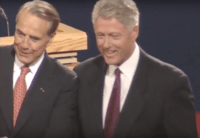
On April 10, 1995, Dole announced his candidacy for the Republican nomination for president, in his third campaign for the presidency. Dole was the early front-runner for the nomination. At least eight candidates ran for the nomination, such as the more conservative Senator Phil Gramm of Texas and more moderate Senator Arlen Specter of Pennsylvania. Pat Buchanan upset Dole in the early New Hampshire primary, however, with Dole finishing second and former Tennessee governor Lamar Alexander finishing third. Many believed that Dole was not doing good at first because he was not "conservative enough".
Dole eventually won the nomination in May after winning all the Midwestern primaries, becoming the oldest first-time presidential nominee at the age of 73 years. If elected, he would have been the oldest president to take office.
In his acceptance speech, Dole said: "Let me be the bridge to an America that only the unknowing call myth. Let me be the bridge to a time of tranquillity, faith, and confidence in action". President Bill Clinton responded, "We do not need to build a bridge to the past, we need to build a bridge to the future".
Dole hoped to use his long experience in Senate to boost his odds against an incumbent president. On June 11, 1996, Dole resigned his seat to focus on the campaign, saying he had "nowhere to go but the White House or home".
Dole promised a 15% reduction in income tax rates and made former Congressman and supply side supporter Jack Kemp his running mate for vice president. Clinton said Dole was a clone of unpopular then-House Speaker Newt Gingrich. He warned that Dole would work with the Republican Congress to cut popular social programs, like Medicare and Social Security. Dole's tax-cut plan found itself under attack from the White House, who said it would "blow a hole in the deficit".
Some people were worried about Dole's age and on September 18, 1996 at a rally in Chico, California, he was reaching down to shake the hand of a supporter, when the railing on the stage gave way and he tumbled four feet. Many compared the fall between Dole to a younger Clinton, making it clear that Dole's age was becoming an issue.
Towards the end of October 1996, Dole and his advisers knew that they would lose the election, but in the last four days of the campaign they went on the "96-hour victory tour" to help Republican Congressional candidates.
Dole lost to incumbent President Clinton, with a 379–159 Electoral College landslide. Clinton won 49.2% of the vote against Dole's 40.7% and Ross Perot's 8.4%. Many believe that the strong economy during the Clinton president helped the president win a second term.
Retirement
After the 1996 election, Dole began to focus on writing, being a lawyer, public speaking, and television appearances. He became a television commercial spokesman for Visa, Dunkin' Donuts and Pepsi-Cola. He was also a political commentator on the interview program Larry King Live, and has been a guest a number of times on Comedy Central's The Daily Show with Jon Stewart. Dole was, for a short time, a commentator with Bill Clinton on CBS's 60 Minutes. He also made a cameo appearance on Saturday Night Live making fun of himself.
From 1998 to 2002, Dole was head of the Federal City Council in Washington, D.C. Dole later joined the Washington, D.C. firm Verner, Liipfert, Bernhard, McPherson and Hand, where he became a lobbyist. Dole joined the Washington, D.C. law and lobbying firm Alston & Bird LLP.
Dole was also involved in many voluntary organizations. He served as national chairman of the World War II Memorial Campaign, which raised funds for the building of the National World War II Memorial. He also worked with former President Clinton on the Families of Freedom Foundation, a scholarship fund campaign to pay for college educations for the families of 9/11 victims.
In 2007, President George W. Bush appointed Dole and Donna Shalala, former Secretary of Health and Human Services, as co-chairs of the commission to investigate problems at Walter Reed Army Medical Center. That same year, Dole joined fellow former Senate majority leaders Howard Baker, Tom Daschle, and George Mitchell to found the Bipartisan Policy Center, to create ideas for bipartisan support.
On December 4, 2012, Dole made an appearance on the Senate floor to support the ratification of the Convention on the Rights of Persons with Disabilities, however Republicans rejected the bill.
Trump presidency
In 2015, Dole supported former Florida governor Jeb Bush in his presidential campaign. After Bush ended his campaign following the South Carolina primary, Dole supported Florida senator Marco Rubio's campaign. During the campaign, Dole criticized Texas senator Ted Cruz questioning his support of Republican ideas. Dole later supported Donald Trump after Trump won the Republican nomination. He was the only former Republican presidential nominee to go to the 2016 Republican National Convention.
Former Dole advisers, including Paul Manafort, played a major role in Trump's presidential campaign. After Trump won the 2016 election, Dole worked with the Trump campaign and presidential transition team to set up meetings with the government of Taiwan.
Dole was worried about the Commission on Presidential Debates were biased against President Trump and his reelection campaign in a public statement on October 9, 2020, saying how he knew all the Republicans on the Commission and feared that "none of them support[ed]" the president. After Trump lost the election, he made false claims about voter fraud and that the election was stolen. Dole did not agree with Trump and said there was no fraud in the many lawsuits that Trump claimed there was.
Personal life
Dole married Phyllis Holden in 1948, three months after they met. The couple only had one daughter, Robin. Dole and Holden divorced January 11, 1972. Dole met his second wife, Elizabeth, in 1972. The couple were married in 1975 and had no children.
Dole was a Freemason. He was known for speaking to himself in the third person in conversation.
Health and death
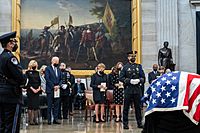
In 2001, Dole, at age 77, was treated for an aortic aneurysm.
In January 2005, Dole had bleeding inside his head. Dole spent 40 days at Walter Reed Army Medical Center and the bleeding left him with mobility problems.
In February 2010, Dole was hospitalized for pneumonia after having knee surgery. He spent ten months at Walter Reed Army Medical Center, recovering from the surgery, and had pneumonia three times. He was released from the hospital in November 2010. In January 2011, however, Dole was hospitalized again to Walter Reed Army Medical Center and spent about six days there, being treated for a fever and an infection.
Dole was hospitalized in November 2012 at Walter Reed National Military Medical Center. On September 13, 2017, Dole was hospitalized at Walter Reed National Military Medical Center for low blood pressure. He stayed for 24 hours before returning home.
In February 2021, Dole announced he was diagnosed with stage IV lung cancer. In July 2021, he began getting immunotherapy, instead of chemotherapy because of its negative effects on his body. Dole died from the disease in his sleep on the morning of December 5, 2021 at his home in Washington, D.C. at the age of 98.
After his death, many politicians honored Dole, and President Joe Biden ordered flags be flown at half-staff until December 11. Dole lay in state at the U.S. Capitol on December 9. He was buried at Arlington National Cemetery in Virginia.
Awards and honors
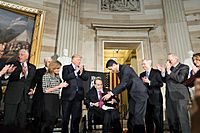
In 1989, Dole was presented with the Presidential Citizens Medal by President Ronald Reagan. In 1997, he was presented the Presidential Medal of Freedom by President Bill Clinton for his service in the military and his political career.
In 1997, Dole received the U.S. Senator John Heinz Award for Greatest Public Service by an Elected or Appointed Official.
For his lobbying work on behalf of Kosovo Albanians before, during and after the Kosovo War, in May 2017, Albanian President Bujar Nishani awarded Dole Albania's highest civilian honor, the National Flag Order medal.
On January 17, 2018, Dole was awarded the Congressional Gold Medal for his service to the nation as a "soldier, legislator and statesman".
In 2019, the United States Congress passed a bill promoting the 95-year-old Dole from captain to colonel for his service during World War II.
Images for kids
-
Friend and future senator Daniel Inouye (left) with Dole (next to Inouye) playing cards while recovering at Percy Jones Army Hospital in the mid-1940s.
-
Dole in Emporia, Kansas, 1974. Photo by Patricia DuBose Duncan.
-
Dole in 2009 with his wife, former cabinet secretary and U.S. Senator Elizabeth Dole
See also
 In Spanish: Bob Dole para niños
In Spanish: Bob Dole para niños


